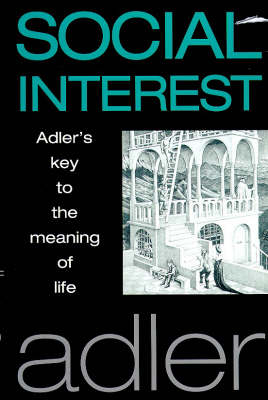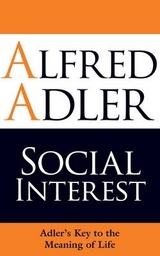
Social Interest
Oneworld Publications (Verlag)
978-1-85168-156-3 (ISBN)
- Titel erscheint in neuer Auflage
- Artikel merken
According to Alfred Adler, an individual's level of "social interest", or "social feeling", is key to his or her success in solving the problems of life. Formulated in childhood, social interest refers to how individuals view themselves in relation to the external world. In an ideal form, it should involve a strong sense of community feeling, cooperation and fellowship - if this is absent, individuals will have problems relating to others and dealing with the world. "Social interest" is a thorough exploration of this key features of Adler's psychology. In it, he explores many of the other key psychological principles with which he is associated, such as inferiority complex and superiority complex, childhood memories, spoilt children, the nature of neurosis and the significant of dreams.
Part 1 Our conception of ourselves and the world: life style and beliefs; life - a matter of "fact"?. Part 2 The psychological approach to investigating life style: the intuitive approach; the philosophical approach; the scientific approach; psychoanalysis and individual psychology; how individual psychology approaches personality and life style; the inferiority and superiority complexes and social interest. Part 3 The tasks of life: facing life's problems; social interest -childhood beginnings; the pampered child; what else can hinder the growth of social interest?; family relationships; childhood illness; social interest at school; sexual awakening; communal life; work; love, marriage and children; withdrawal from social interest; other tests of social interest. Part 4 The problem of body and soul: an evolutionary perspective; mental equilibrium is constantly threatened; how mind and body influence one another; a case study. Part 5 Form, movement and character: a "scientific" look at the human "form"; the meaning of physical form; the meaning of movement. Part 6 The inferiority complex: inadequacy - the impulse for development; the sense of inferiority in child development; aggression; the place of social interest in humanity's progress; critical behaviour; social interest and emotional development; the effects of lack of social interest; neurosis and psychosomatic disorders; individual behaviour; the inferiority complex. Part 7 The superiority complex: characteristics of the superiority complex (1); social implications of the superiority complex; characteristics of the superiority complex (2); a word of caution; further reflections. Part 8 Types of maladjustment: types and individuals; problem children; neurosis; suicide; criminal tendencies; addiction. Part 9 The unreal world of the pampered: childhood beginnings; each case is unique; early relationships and life style; characteristics of pampered individuals; advantages of individual psychology's approach. Part 10 What really is a neurosis?: a problem of definition; neurosis and the sense of inferiority; explaining the symptoms of neurosis; causes and dynamics of neurosis; dreams; conclusions. Part 11 Sexual deviance: different psychological approaches; individual psychology's approach; the development of sexual deviance in individuals; interpreting the evidence - a case study; concluding remarks. Part 12 Earliest childhood memories: the unity of the ego; memory and life style; Freud misses the point; case studies. Part 13 Socially obstructive situations in childhood and their removal: family relationships; childhood illness; sex education; position in the family group - the only child, the firstborn, the second child, the youngest child; areas for further research. Part 14 Daydreams and night dreams: imagination's role in life style; creativity; imagination and the goal of superiority; understanding dreams; the Freudian theory of dreams - a critique; dreams maintain a distance from social
| Erscheint lt. Verlag | 30.7.1998 |
|---|---|
| Übersetzer | Colin Brett |
| Verlagsort | London |
| Sprache | englisch |
| Maße | 169 x 211 mm |
| Gewicht | 272 g |
| Themenwelt | Sachbuch/Ratgeber ► Gesundheit / Leben / Psychologie ► Psychologie |
| Geisteswissenschaften ► Psychologie ► Psychoanalyse / Tiefenpsychologie | |
| ISBN-10 | 1-85168-156-6 / 1851681566 |
| ISBN-13 | 978-1-85168-156-3 / 9781851681563 |
| Zustand | Neuware |
| Haben Sie eine Frage zum Produkt? |
aus dem Bereich



